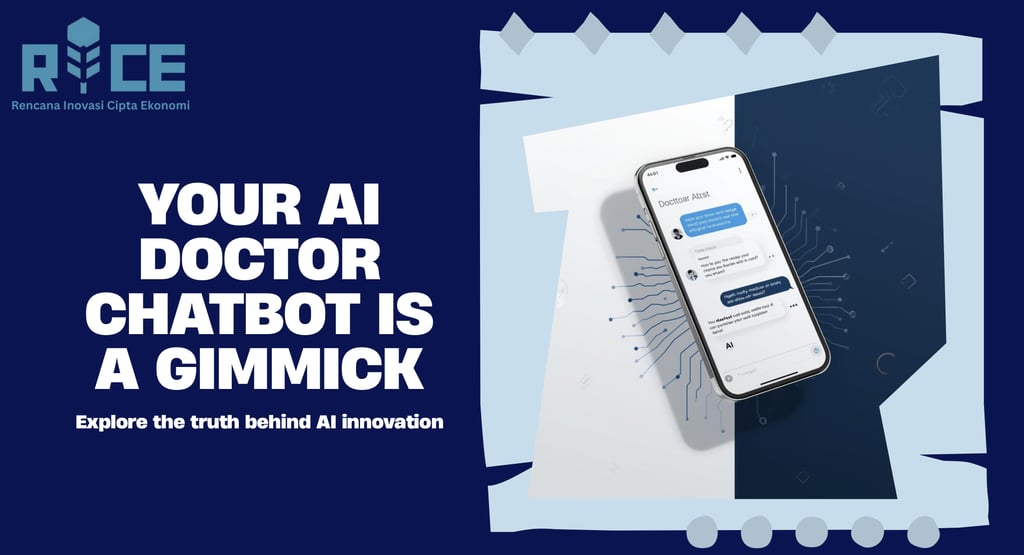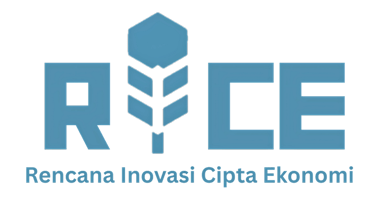Your AI Doctor Chatbot Is a Gimmick: The Real AI Revolution Is Hidden in the Lab, Not on Your Phone
The real AI revolution in healthcare is in labs, accelerating drug discovery and perfecting precision diagnostics.
INDUSTRIES
Rice AI (Ratna)
9/26/20256 min read


Imagine a world where your smartphone app instantly diagnoses your mysterious cough, prescribes medication, and even offers a virtual pat on the back. This vision of an "AI doctor chatbot" has captured the public imagination, promising convenient, on-demand healthcare from the comfort of your living room. Countless articles and news segments laud these digital companions as the vanguard of a new medical era, a quick fix for overwhelmed healthcare systems. However, for those of us deeply entrenched in the actual advancements of artificial intelligence within the healthcare landscape, this popular narrative is, frankly, a distracting sideshow. While these chatbots may offer a superficial veneer of accessibility, they largely represent a gimmick when compared to the profound, transformative changes AI is quietly orchestrating in laboratories, research institutions, and specialized clinical settings. The true revolution isn't in a conversational interface attempting to replicate a physician; it's in the complex algorithms sifting through genomic data, accelerating drug discovery, and refining diagnostic precision at a scale unimaginable just a decade ago. It’s a revolution happening behind the scenes, far from the polished app interfaces, and its impact is fundamentally reshaping the future of medicine in ways that matter most.
The Allure and Limitations of the Conversational AI Doctor
The appeal of an AI doctor chatbot is undeniable. In a world grappling with physician shortages, long wait times, and the rising cost of care, the promise of instant, free, or low-cost medical advice is alluring. These applications can answer basic medical questions, guide users through symptom checkers, and even connect them to human doctors for teleconsultations. They tap into large language models to process queries and provide information, often mimicking human-like conversation. This superficial interaction can create a perception of comprehensive care, but it fundamentally misrepresents the intricate nature of medical diagnosis and treatment.
The limitations, however, are extensive and critical. A chatbot, no matter how sophisticated, cannot perform a physical examination. It cannot detect subtle cues in a patient's posture, skin tone, or breathing that a trained physician would immediately notice. It lacks the contextual understanding necessary to interpret a patient's full medical history, lifestyle factors, and emotional state in a nuanced way. Furthermore, the regulatory landscape for AI-driven diagnostic tools is still evolving, and the ethical implications surrounding liability for incorrect diagnoses from an autonomous system are monumental. Data privacy and security are also significant concerns when sensitive health information is processed by consumer-facing applications. While useful for initial triage or providing general health information, positioning these chatbots as substitutes for genuine medical consultation is not only misleading but potentially dangerous, underscoring why Rice AI focuses its efforts on validated, high-impact AI solutions within controlled, professional environments rather than speculative public-facing applications.
The Silent Revolution: AI in Drug Discovery and Development
The real seismic shift driven by AI in healthcare is occurring deep within the research pipeline, particularly in drug discovery and development. For decades, the process of bringing a new drug to market has been extraordinarily slow, expensive, and riddled with failure. AI is fundamentally changing this paradigm. Machine learning algorithms can analyze vast chemical libraries and biological data to identify novel drug candidates with unprecedented speed and accuracy. They can predict how potential compounds will interact with specific proteins or disease targets, dramatically reducing the need for costly and time-consuming laboratory experiments.
Companies are leveraging AI to optimize compound design, predicting efficacy and potential side effects even before synthesis. This computational approach allows researchers to explore millions, even billions, of molecular possibilities that would be impossible with traditional methods. Beyond initial discovery, AI is also streamlining preclinical and clinical trial phases. It can help identify the most suitable patient cohorts for trials, predict patient response to therapies, and analyze trial data more efficiently, potentially shortening the overall drug development timeline from over a decade to mere years. The economic implications are staggering, promising to reduce the multi-billion-dollar cost of bringing a single drug to market, ultimately leading to more accessible and affordable treatments for a wider range of diseases (Fleming et al., 2023). This represents a true revolution, not a mere enhancement of existing consumer tools.
Precision Diagnostics and Prognostics: Beyond Human Vision
Another area where AI is unleashing profound capabilities is in precision diagnostics and prognostics. Here, AI isn't attempting to replace a doctor's holistic judgment but rather to augment a specialist's ability to detect, analyze, and predict outcomes with superior accuracy and speed, often surpassing human capabilities in specific, data-intensive tasks. Consider medical imaging: radiologists spend years training to identify subtle anomalies in X-rays, MRIs, and CT scans. AI algorithms, trained on massive datasets of annotated images, can now detect cancerous lesions, early signs of neurological disorders, or cardiovascular issues with incredible precision, sometimes identifying patterns that are invisible to the human eye in initial screenings.
In pathology, AI-powered microscopy can analyze biopsy slides to detect cancer cells, grade tumor aggressiveness, and even predict treatment response, assisting pathologists in making more accurate and consistent diagnoses (Chang et al., 2023). Beyond imaging, AI is transforming genomics and personalized medicine. By analyzing vast amounts of genomic, proteomic, and clinical data, AI can identify specific biomarkers associated with diseases, predict an individual's risk for certain conditions, and recommend highly personalized treatment regimens based on their unique biological profile. This move towards truly individualized medicine, tailoring therapies to a patient's genetic makeup and disease characteristics, is a cornerstone of future healthcare, promising higher efficacy and fewer adverse effects. At Rice AI, our focus on developing robust, explainable AI models for these critical diagnostic applications underscores our commitment to tangible clinical impact. We believe in empowering medical professionals with tools that genuinely enhance their capabilities, rather than superficial substitutes.
Operational Efficiency and Research Acceleration in the Lab
The revolution extends beyond drug discovery and diagnostics into the very fabric of laboratory operations and scientific research. AI is becoming an indispensable tool for enhancing operational efficiency, automating mundane tasks, and accelerating the pace of scientific inquiry. In the lab, AI-driven robotics and automation systems are performing repetitive experimental procedures, data collection, and sample processing with unparalleled precision and throughput, freeing up scientists to focus on higher-level analytical and creative tasks. AI-powered laboratory information management systems (LIMS) can streamline data management, ensure quality control, and track experimental progress, drastically reducing human error and improving reproducibility.
Furthermore, AI is acting as a powerful co-pilot in scientific discovery. Researchers are using AI to sift through colossal volumes of scientific literature, identify emerging trends, generate novel hypotheses, and even design experiments more effectively. By analyzing real-world evidence (RWE) from electronic health records, insurance claims, and patient registries, AI can uncover previously hidden correlations between treatments, patient outcomes, and disease progression. This ability to extract meaningful insights from diverse, complex datasets accelerates understanding of diseases, improves treatment protocols, and informs public health strategies. The integration of AI into these operational and research workflows means that the foundational work of medicine is becoming more agile, data-driven, and ultimately, more impactful.
Conclusion: Focusing on the True Horizon of AI in Healthcare
The popular narrative surrounding AI in healthcare often fixates on the most visible, yet least transformative, applications like consumer-facing "AI doctor chatbots." While these tools might offer rudimentary convenience, they pale in comparison to the profound, often unseen, revolution taking place within research labs and specialized clinical environments. The real AI revolution is not about replacing human doctors with algorithms on a phone screen; it's about empowering scientists and clinicians with tools that unlock unprecedented capabilities in drug discovery, diagnostics, and personalized medicine.
As industry experts, our focus must remain steadfast on these areas of genuine impact. Investing in advanced AI for molecular modeling, genomic analysis, precision imaging, and operational optimization is where the true paradigm shifts will occur. These are the domains where AI is not a gimmick but a fundamental engine of progress, promising to accelerate the development of life-saving therapies, enhance diagnostic accuracy, and ultimately deliver more effective, personalized care to patients worldwide. The future of healthcare will indeed be shaped by AI, but it will be a future built on rigorous scientific application and profound technological collaboration, not on the superficial allure of a virtual physician. At Rice AI, we are committed to being at the forefront of this genuine revolution, developing the robust, ethical, and transformative AI solutions that truly advance medicine, rather than simply repackaging existing information. We believe in building the tools that empower medical professionals to achieve breakthroughs, moving beyond the hype to deliver tangible results that benefit humanity.
References
Chang, H., Li, X., Wu, X., & Zou, J. (2023). Deep Learning in Digital Pathology: Current Applications and Future Directions. Journal of Clinical Pathology, 76(3), 154-162. https://jcp.bmj.com/content/76/3/154
Fleming, N., Salko, A., & Varma, H. (2023). The AI Revolution in Drug Discovery. Nature Reviews Drug Discovery, 22(1), 1-2. https://www.nature.com/articles/d41573-022-00216-9
#AIinHealthcare #MedicalAI #DrugDiscovery #PrecisionMedicine #AIDiagnostics #HealthcareInnovation #AIResearch #DigitalHealth #MedTech #FutureofMedicine #RiceAI #HealthTech #LabAutomation #Bioinformatics #AIforGood
RICE AI Consultant
To be the most trusted partner in digital transformation and AI innovation, helping organizations grow sustainably and create a better future.
Connect with us
Email: consultant@riceai.net
+62 822-2154-2090 (Marketing)
© 2025. All rights reserved.


+62 851-1748-1134 (Office)
IG: @riceai.consultant
